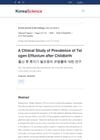 1 citations,
May 2023 in “European Journal of Human Genetics”
1 citations,
May 2023 in “European Journal of Human Genetics” Rare ULBP3 gene changes may raise the risk of Alopecia areata, a certain FAS gene deletion could cause a dysfunctional protein in an immune disorder, and having one copy of a specific genetic deletion is okay, but two copies cause sickle cell disease.
 1 citations,
April 2023 in “Frontiers in Genetics”
1 citations,
April 2023 in “Frontiers in Genetics” The document concludes that individuals with a rare genetic disorder linked to the AEBP1 gene may experience a unique type of hair loss and should be monitored for heart issues.
1 citations,
December 2019 in “Frontiers in endocrinology” Higher androgen levels during puberty are linked to shorter adult height in boys with Silver-Russell syndrome.

Celiac disease requires more than just a gluten-free diet for effective management.
The KRTAP36-2 gene in sheep affects wool yield.
 October 2023 in “IntechOpen eBooks”
October 2023 in “IntechOpen eBooks” Genes and epigenetic changes are important in the development of Polycystic Ovary Syndrome.
 January 2023 in “Our Dermatology Online”
January 2023 in “Our Dermatology Online” Most pregnant women experience skin changes, especially increased pigmentation.
January 2023 in “Indian Dermatology Online Journal” Two newborns with rare skin infections were successfully treated with antifungal cream.
 November 2022 in “Scientific Reports”
November 2022 in “Scientific Reports” Certain ESR1 gene variations may affect hormone levels and fat distribution in women with high male hormone levels.
 November 2022 in “Arab Gulf Journal of Scientific Research”
November 2022 in “Arab Gulf Journal of Scientific Research” Taurine is important for many body functions and its deficiency can cause health problems.
 August 2022 in “IntechOpen eBooks”
August 2022 in “IntechOpen eBooks” Congenital Adrenal Hyperplasia is a rare inherited disease causing hormone imbalances, affecting growth, fertility, and heart health, diagnosed through blood tests and treated with medication and lifestyle changes.
 32 citations,
December 1969 in “The Lancet”
32 citations,
December 1969 in “The Lancet” Children with marasmus have more resting hair follicles and thinner, less pigmented hair, showing long-term malnutrition.
 114 citations,
January 2007 in “Drug Safety”
114 citations,
January 2007 in “Drug Safety” Some drugs can cause skin, nail, and hair problems, which are important for healthcare professionals to recognize and report.
 25 citations,
June 2019 in “Endocrine Related Cancer”
25 citations,
June 2019 in “Endocrine Related Cancer” Mutations in certain receptors can cause diseases and offer new treatment options.
 1 citations,
January 2016 in “Journal of stem cell research and medicine”
1 citations,
January 2016 in “Journal of stem cell research and medicine” Fat-derived stem cell therapies can potentially increase hair growth and thickness in people with hair loss.
 1 citations,
January 2016 in “Journal of stem cell research and medicine”
1 citations,
January 2016 in “Journal of stem cell research and medicine” Fat-derived stem cell therapies can potentially increase hair growth and thickness in people with hair loss.
 15 citations,
January 2013 in “European Journal of Pediatrics”
15 citations,
January 2013 in “European Journal of Pediatrics” Patients with Shwachman-Diamond syndrome often get misdiagnosed due to a wide range of symptoms, including immune system problems and bone abnormalities.
 4 citations,
October 2022 in “Evidence-based complementary and alternative medicine”
4 citations,
October 2022 in “Evidence-based complementary and alternative medicine” Ficus carica extract improved fertility in rats and may help with certain health conditions.
 November 2013 in “John Wiley & Sons, Ltd eBooks”
November 2013 in “John Wiley & Sons, Ltd eBooks” The document concludes that accurate diagnosis of male and female gonadal disorders is crucial for effective treatment and better patient outcomes.
2 citations,
January 2022 in “The Application of Clinical Genetics” A young Russian girl with Meier-Gorlin syndrome has two new mutations in the CDC6 gene.
1 citations,
November 2022 in “Diagnostics” A woman with a rare hormone resistance condition also had missing teeth and hair loss, which might be new symptoms of her genetic disorder.
 October 2023 in “Journal of the Endocrine Society”
October 2023 in “Journal of the Endocrine Society” Losing weight and taking birth control pills can greatly improve severe male hormone excess in women with PCOS.
23 citations,
June 1997 in “Baillière's clinical obstetrics and gynaecology” Most women with too much androgens have PCOS, which can be managed with birth control pills, medication for hair growth, and fertility treatments, and losing weight helps too.
 October 2023 in “Journal of the Endocrine Society”
October 2023 in “Journal of the Endocrine Society” Losing weight, possibly through bariatric surgery, is key to improving PCOS and hyperandrogenism symptoms in obese patients.
 104 citations,
May 2019 in “F1000Research”
104 citations,
May 2019 in “F1000Research” Losing weight, fixing varicoceles, and using advanced sperm selection methods improve male infertility treatment outcomes.
 64 citations,
January 1998 in “Drugs”
64 citations,
January 1998 in “Drugs” Dienogest combined with ethinylestradiol is a highly effective birth control that improves menstrual symptoms and has manageable side effects.
15 citations,
May 2011 in “International Journal of Dermatology” Premature birth increases the risk of striae distensae.
 1 citations,
January 2009 in “Journal of Clinical Dermatology”
1 citations,
January 2009 in “Journal of Clinical Dermatology” Hair loss after childbirth is more common in women who have had multiple births, cesarean deliveries, significant weight gain, and full-term pregnancies.
 373 citations,
September 2009 in “Obstetrics & Gynecology”
373 citations,
September 2009 in “Obstetrics & Gynecology” The bulletin provides guidelines for diagnosing and managing PCOS, suggesting weight loss, hormonal contraceptives, and diabetes screening, with clomiphene for infertility and various treatments for excess hair.
 November 2023 in “L'Endocrinologo”
November 2023 in “L'Endocrinologo” Women with PCOS are more likely to experience sexual dysfunction, but lifestyle changes and weight loss can improve sexual function.






















